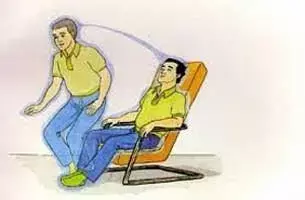- Home
- Medical news & Guidelines
- Anesthesiology
- Cardiology and CTVS
- Critical Care
- Dentistry
- Dermatology
- Diabetes and Endocrinology
- ENT
- Gastroenterology
- Medicine
- Nephrology
- Neurology
- Obstretics-Gynaecology
- Oncology
- Ophthalmology
- Orthopaedics
- Pediatrics-Neonatology
- Psychiatry
- Pulmonology
- Radiology
- Surgery
- Urology
- Laboratory Medicine
- Diet
- Nursing
- Paramedical
- Physiotherapy
- Health news
- Fact Check
- Bone Health Fact Check
- Brain Health Fact Check
- Cancer Related Fact Check
- Child Care Fact Check
- Dental and oral health fact check
- Diabetes and metabolic health fact check
- Diet and Nutrition Fact Check
- Eye and ENT Care Fact Check
- Fitness fact check
- Gut health fact check
- Heart health fact check
- Kidney health fact check
- Medical education fact check
- Men's health fact check
- Respiratory fact check
- Skin and hair care fact check
- Vaccine and Immunization fact check
- Women's health fact check
- AYUSH
- State News
- Andaman and Nicobar Islands
- Andhra Pradesh
- Arunachal Pradesh
- Assam
- Bihar
- Chandigarh
- Chattisgarh
- Dadra and Nagar Haveli
- Daman and Diu
- Delhi
- Goa
- Gujarat
- Haryana
- Himachal Pradesh
- Jammu & Kashmir
- Jharkhand
- Karnataka
- Kerala
- Ladakh
- Lakshadweep
- Madhya Pradesh
- Maharashtra
- Manipur
- Meghalaya
- Mizoram
- Nagaland
- Odisha
- Puducherry
- Punjab
- Rajasthan
- Sikkim
- Tamil Nadu
- Telangana
- Tripura
- Uttar Pradesh
- Uttrakhand
- West Bengal
- Medical Education
- Industry
Diabetic sensorimotor polyneuroneuropathy associated with orthostatic blood pressure changes

Canada: Patients with diabetic sensorimotor polyneuropathy (DSP) frequently experience orthostatic hypertension and orthostatic hypotension, states a recent study in the Journal of Diabetes and its Complications. Orthostatic hypertension compared to orthostatic hypotension was shown to be associated with shorter diabetes duration. Supine and 3 min standing BP is a simple bedside test for orthostatic hypertension and orthostatic hypotension in DSP.
Diabetic sensorimotor polyneuropathy, a type of nerve damage, is a common diabetes complication that is linked with increased mortality, neuropathic pain, foot ulceration, and lower-limb amputation.
The study was conducted by Vera Bril, Toronto General Hospital, Toronto, Ontario, Canada, and colleagues to determine the prevalence and associated clinical characteristics of orthostatic hypotension and orthostatic hypertension in DSP patients.
For this purpose, the researchers conducted a single-center retrospective cross-sectional study on 200 DSP patients who had 3-minute orthostatic measures as part of the standard clinic evaluation. The heart rate (HR) and blood pressure (BP) supine were measured and against after 3 min of standing. Supine and 3 min standing BP is a simple bedside test for orthostatic hypertension and orthostatic hypotension in DSP.
Based on their study, the researchers reported the following findings:
- The prevalence of orthostatic hypotension was 19.5% and that of orthostatic hypertension was 23%.
- Subjects with orthostatic hypotension had significantly longer diabetes duration than subjects who were normotensive and those with orthostatic hypertension.
- Quantitatively, BP changes from supine to standing correlated with diabetes duration (R = 0.306) and age (R = 0.434) in subjects with orthostatic hypotension.
The researchers conclude, "In patients with diabetic sensorimotor polyneuropathy (DSP), Orthostatic hypertension and orthostatic hypotension are frequent. Orthostatic hypertension is associated with a shorter diabetes duration than orthostatic hypotension."
Further, BP changes from supine to standing correlated positively with diabetes duration.
Reference:
Idiaquez Rios JF, Lovblom LE, Perkins BA, Bril V. Orthostatic blood pressure changes and diabetes duration. J Diabetes Complications. 2022 Mar 15:108169. doi: 10.1016/j.jdiacomp.2022.108169. Epub ahead of print. PMID: 35307262.
Dr Kamal Kant Kohli-MBBS, DTCD- a chest specialist with more than 30 years of practice and a flair for writing clinical articles, Dr Kamal Kant Kohli joined Medical Dialogues as a Chief Editor of Medical News. Besides writing articles, as an editor, he proofreads and verifies all the medical content published on Medical Dialogues including those coming from journals, studies,medical conferences,guidelines etc. Email: drkohli@medicaldialogues.in. Contact no. 011-43720751


